Engine Owners Conference Summary.
By Bob Siddall and Naomi Cornish, General Secretary.
The Engine Owners, Drivers and Crew meeting was held on Sunday 21st March at 10:00am.
We had over 120 register for this event with near enough all joining us on the day.
Bob Siddall opened up the meeting by welcoming all. He introduced and gave a special welcome to Rob Wing, our newly elected chairman. We have included topics that are relevant to both full-size and miniature engine owners and users. Bob reminded the audience about submitting articles to Brian Gooding for Steaming. The driving course has been postponed but it might be possible to hold later in the year. Traction Engines & the Law has been updated and will be published soon. Bob gave thanks to Dr Raymond Rowe and Nigel Hawkes who have been working on this.
Normally at Kilsby, we would have had Kathy Smith with us selling sales items, but participants were encouraged to go to the website (ntet.co.uk/shop) instead to browse and buy.
 Martin Levers, Business Unit Director of Walker Midgley Insurance Brokers gave a presentation on the subject of insurance specific to Walker Midgley. Martin gave the key details that you get with your steam engine policy.
Martin Levers, Business Unit Director of Walker Midgley Insurance Brokers gave a presentation on the subject of insurance specific to Walker Midgley. Martin gave the key details that you get with your steam engine policy.
Steam Traction Key Cover Details:
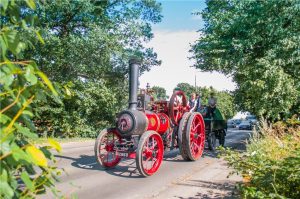 Any driver with full Road Traffic Act cover and no minimum age for drivers and young drivers do not have to be steam apprentices but remember that if on road they need the appropriate driving licence – off road no driving licence needed
Any driver with full Road Traffic Act cover and no minimum age for drivers and young drivers do not have to be steam apprentices but remember that if on road they need the appropriate driving licence – off road no driving licence needed- Use is Social, Domestic and Pleasure and use for rallies, shows, working demonstrations and road runs
- Use whilst towing
- Excludes use for hire or reward but includes cover for driver experience
- £5m public liability included for all your traction engine activities plus cover is included for your crew
- Includes cover for carriage of passengers in/on the engine or on a trailer pulled by the engine providing no remuneration other than out of pocket expenses and/or supply of fuel
- Engine in transit cover included on your low loader or on a low loader belonging to another person
- The sum insured for accidental damage fire and theft can be any amount chosen by you up to the engine’s current market value. Claims will be paid in full up to the sum insured chosen by you and for all claims other than a theft claim you will retain ownership
- Flat premium for the RTA/PL cover
- 4 Bands of premium for Accidental Damage Fire & Theft cover depending on the sum insured.
- The engine and constituent parts whether attached or detached are covered anywhere in the Geographical limits
- Optional cover for Living Vans, Engine Trailers, Water Carts etc
- Home Workshop Buildings, Machinery, Tools and Equipment and Stock of Spare Parts optional cover available
Model Steam Key Cover Details:
Covers model/miniature steam road vehicles (up to and including 6” scale) along with ancillary items such as miniature water carts, miniature riding trailers and the like
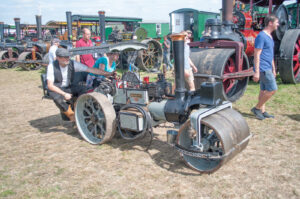 Any driver with full Road Traffic Act cover and no minimum age for drivers and young drivers do not have to be steam apprentices but remember that if on road they need the appropriate driving licence – off road no driving licence needed
Any driver with full Road Traffic Act cover and no minimum age for drivers and young drivers do not have to be steam apprentices but remember that if on road they need the appropriate driving licence – off road no driving licence needed- Use is Social, Domestic and Pleasure and use for rallies, shows, working demonstrations and road runs
- Use whilst towing
- Excludes use for hire or reward but includes cover for driver experience
- £5m public liability included for all your miniature traction engine activities
- Includes cover for carriage of passengers in/on the engine or on a trailer pulled by the engine providing no remuneration other than out of pocket expenses and/or supply of fuel
- Engine in transit cover included on your own vehicle, trailer or low loader or on a low loader belonging to another person
- The sum insured for accidental damage fire and theft should be for the engines current market value. Claims will be paid in full up to the sum insured chosen by you and for all claims other than a theft claim you will retain ownership
- Flat premium for the RTA/PL cover
- 1 premium rate for Accidental Damage Fire & Theft cover.
- Optional cover for Miniature Living Vans, Engine Trailers, Water Carts etc
A range of optional covers including Home Workshop Buildings, Machinery, Tools and Equipment, Stock of Spare Parts and Road Trailers is available
Van, Lorry and Low-Loader Key Cover Details:
Van, Lorry and Low Loader Insurance is designed to provide cover for rigid bodied vans, pickups and lorries (including beaver tail) or articulated vehicles used for the transportation of models (locomotives etc), steam road vehicles, portable engines, vintage tractors, historic vehicles, living vans, trailers, water carts, implements and the like
- Any driver over 25 – we can cover specified under 25 at additional cost
- 6000 mile annual mileage limit
- Road Traffic Act and Accidental Damage Fire & Theft cover – with £250 excess
- Social Domestic & Pleasure use only and use whilst towing
- Excludes hire or reward but you can carry someone else’s engine and they can pay you out of pocket expense and fuel
- No cover for the load carried – yours or someone else’s
- Discounted rates for NTET members
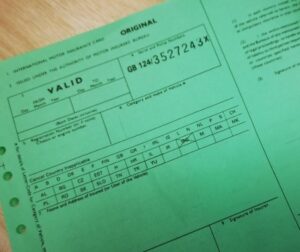
Applicable to all above policies: Green Cards – following Brexit: You may be required to carry a physical Green Card while driving your vehicle in any European Economic Area (EEA) country (EU plus Iceland, Liechtenstein and Norway) as well as Andorra, Serbia and Switzerland. It is now perfectly acceptable to carry a copy of your physical Green Card on white paper. Green Cards are an international certificate of insurance issued by insurance providers in the UK, guaranteeing that the motorist has the necessary minimum motor insurance cover for driving in the country being travelled to. Please contact us in good time before you travel so that a Green Card can be issued prior to departure.
Questions on Insurance of engines being transported by:
Their owners on their own trailer/low loader:
The low loader policy does not provide any cover for loads carried, it is the engine policy that has the cover (providing they have Acc. Damage Fire & Theft cover of course). If owner just has the RTA/PL cover, there is no cover for damage to the engine.
By a contractor on behalf of an owner – commercial arrangement:
The contractor should provide the cover – make sure it’s an All Risks/Full Responsibility cover and not one of the RHA covers as this only provides a max cover of approx. £1300/ tonne.
By an engine owner transporting an engine for a friend – non-commercial arrangement:
Cover would be on the Engine owner’s policy providing they have Acc. Damage Fire & Theft cover. If owner just has the RTA/PL cover, there is no cover for damage to the engine – there is no cover on the Low Loader policy.
How is the load insured?
Either by a contractor (check conditions of carriage that you are signing, RHA/All Risks/Full Responsibility) if using or on an engine owners own engine policy.
What happens if the vehicle is involved in a collision, rolls down an embankment and catches fire. Depending on the value of the steam vehicle in question, the cost of rebuilding the remains may be more than the cost of another similar type of vehicle. Will the insurers give an arbitrary ‘written off’ value and then scrap the remains:
On the Engine policy, the amount payable in the event of a claim is up to the sum insured that has been paid for. Owner retains ownership of the engine.
If an owner is fussy about how their vehicle is secured down and won’t let the haulier secure it how they’d prefer, and then the load moves, will the haulier’s insurance still pay out or will the insurance be declared void because it wasn’t secured ‘properly’:
First thing is to ensure you know the conditions of carriage. If you sign a contract of carriage under RHA conditions, this only provides a cover of about £1300/tonne, so make sure that you get an All Risks/Full Responsibility cover for the value of the engine. The haulier is the expert and is responsible for his load. If the load is not secured correctly, that is the haulier’s responsibility, that’s what you are paying him for.
Bob thanked Martin for his presentation which will no doubt raise further questions.
 David Smith gave a presentation on technical matters. David explained what is going on in the background, what our issues are, what we need to promote, and the liaisons that we have with other similar, like-minded organisations. He explained who the team and officers are; Ian Cooper, Insurance Officer, Colin Melvyn-Harris, V765 Officer and John Durling FBHVC Liaison Officer, plus Nick Bosworth and Naomi Cornish, who help with the development and more technical aspects of the website.
David Smith gave a presentation on technical matters. David explained what is going on in the background, what our issues are, what we need to promote, and the liaisons that we have with other similar, like-minded organisations. He explained who the team and officers are; Ian Cooper, Insurance Officer, Colin Melvyn-Harris, V765 Officer and John Durling FBHVC Liaison Officer, plus Nick Bosworth and Naomi Cornish, who help with the development and more technical aspects of the website.
David gave his own update on the three insurance brokers, Walker Midgley, One Broker and James Campbell.
He explained the situation regarding Clean Air Zones [more of which can be found in his TSU Report in Steaming].
The features of the new Online Membership System were then explained. It is simple to use, is cloud based and can be accessed 24/7 on any device that has an internet connection. Members are encouraged to create their own login account so that they can take ownership of their own data, and update it when necessary. There is also a new addition of family memberships.
Concluding, David got his crystal ball out and summarised his thoughts on the future.
- The Environment – Everyone’s problem. Traction engines are not major polluters, but what the eye sees, the heart grieves about.
- The Objective of the NTET: Preserving our heritage with steam on the road; but frankly, it is not that simple.
- The Role of the NTET: Many facets, a blend of fun and the seriousness, but not all of them are agreeable to everyone, all of the time.
- Potential for Failure: We are a voluntary, charitable organisation; the challenges are increasing for us, but the tangible support is reducing.
Charlie Cribbes then gave a presentation on “Towing and the Law”
Trailers up to 3,500kg Maximum Authorised Weight (Mass)
Driving Licences awarded before January 1st 1997:
- If you passed your test before January 1st 1997 you can drive a vehicle on your Category ‘B’ entitlement up to 7,500kg MAM with a trailer for as long as the combined MAM does not exceed 8,250kg.
MAM = Maximum Authorised Mass: The limit of how much a vehicle can weigh when loaded
In old money this was the Maximum Gross Weight (MGW)
Driving Licences awarded on or after January 1st 1997:
A Category ‘B’ licence holder:
- May tow using a car or van up to a MAM of 3,500kg with a trailer up to 750kg MAM.
- May tow a trailer over 750kg MAM but the combined MAM of the trailer and towing vehicle cannot exceed 3,500kg
- May Not tow over 750kg MAM and have a combined MAM in excess of 3,500kg. Must pass the Category ‘E’ test which gives entitlement (B+E) on the licence
- Note: If the driver of towing vehicle is a novice Category ‘B’ holder it is recommended that they do not exceed 85% MAM
Trailer Information:
- The maximum size of a trailer you may tow is 2.55m wide and 7m long
- If the trailer is un-braked the maximum MAM is 750kg or half the weight of the towing vehicle which-ever is the less
- Lights and caravan accessories are connected in 2 ways:
- the old way using an ‘N’ type plug for lights and an ‘S’ type plug for the Caravan accessories.
- the new way is the 13 pin EURO plug which combines both (note the Reverse light function on the Socket must be wired in)
- If the vehicle is over 750kg it must have a reversing light and if over 6m long it must have 2 reversing lights
Towing Mirrors:
- It is a legal requirement to fit mirrors where the width of the towing vehicle is less than the trailing vehicle.
- Towing mirrors must provide a view 4m out from the side of the trailer and for a distance of 20m.
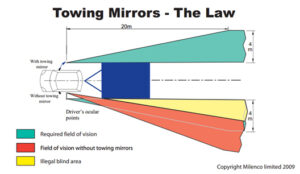
Tow Bars:
- Since 1st August 1998, all tow bars fitted to cars must be type approved (EC94/20). This can be a MOT failure if the garage spots it. You can only fit a drop plate spacer or bike rack if the tow bar has this ‘type’ approval.
Building your own Trailer:
- Since 1st October 1988 all braked trailers must have overrun brakes (3,500kg maximum weight) and since 1st January 2012, all new trailers must be type approved or pass an IVA inspection.
Insurance:
- Any vehicle requires at least 3rd party insurance. Damage caused by a trailer becoming detached is covered by the towing vehicles policy, to specified limits. There is no legal requirement to insure the trailer, but any damage is not covered by the vehicles policy. If you have had a tow bar fitted to your car yourself, check with your insurance if this is classed as a modification to your vehicle and notify them that you have fitted one.
Rally Organisers Conference:
The rally organiser’s conference will be held on Saturday 27th March as a webinar. The conference will hopefully help the rally organisers make decisions about their events.
Steam Apprentice Club:
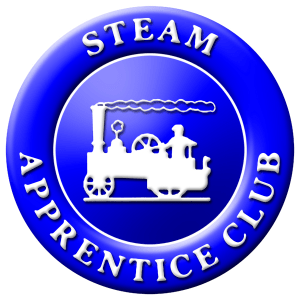 Nick Bosworth then spoke about the Steam Apprentice Club. Jim Huntley has taken over the editorship of Raising Steam, and Louise Maunder has joined the committee following her election onto the NTET’s General Council last November.
Nick Bosworth then spoke about the Steam Apprentice Club. Jim Huntley has taken over the editorship of Raising Steam, and Louise Maunder has joined the committee following her election onto the NTET’s General Council last November.
The lockdown last year prevented all but one Driving Day going ahead. The one that did was held after a risk assessment had been conducted, ensuring washing facilities were in place, larger communal shelter areas were provided and apprentices provided their own lunch. The apprentices were also grouped into bubbles of two apprentices with one engine driver, and these separated groups were apart for the day. It is uncertain at the moment what driving days can go ahead this year, but the Stithians event has definitely been cancelled.
Nick explained about how you can run a driving day, and would be delighted to hear from anyone who feels willing and able to do so. If you would like further details or a chat, email Nick via sac.chairman@ntet.co.uk
Looking forward, the Twitter Steam Rally (2) is taking place on 1st May, and we will be running the usual Great Dorset Steam Fair colouring in and photographic competitions virtually, as we did last year.
Nick also made a plea for articles for the Raising Steam magazine, the Editor can only publish the material that he receives. These articles don’t just have to come from apprentices, everyone is encouraged to send in short articles, photos or technical articles which apprentices might find of interest. You can email them directly to Jim via sac.raisingsteam@ntet.co.uk
Nick explained the two SAC Awards.
One being the Apprentice of the Year trophy, which is presented to an apprentice who has made an effort, willingness or great enthusiasm for our hobby.
The other is the Technical Achievement Award, given to an apprentice who has been involved in the more technical, hands-on side of our hobby, like helping with a restoration or building of an engine.
If you know of an apprentice who deserves either of these awards, please email Nick.
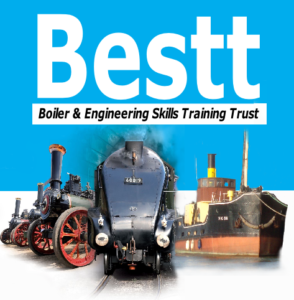 BESTT:
BESTT:
Andrew Semple, our President and a founder member of the Boiler and Engineering Skills Training Trust (BESTT), stated that like every organisation, the pandemic has affected the operations. Railway workshops are working under difficult conditions. The last six trainees have come to the end of their placements, 5 of these having now obtained employment.
Over the last eight years, BESTT has received over one million pounds of funding which has resulted in 15 apprentice boiler makers, and a similar number trained in locomotive engineering. The Lottery are unlikely to fund any more of this type of work in the short-term, and BESTT will have to stand on its own feet for the future.
With this in mind, BESTT have been looking at effective ways of offering online short courses and assessments in specialist skill areas. They already offer courses in riveting and boiler washouts which have been taken up by railways and boiler workshops. They are working on a new course on carriage restoration and maintenance. BESTT are exploring ways of training in other areas such as re-tubing, boiler staying, and white metalling etc., so that anyone who is either in a workshop or doing a restoration at home can dip in and top-up their knowledge.
BESTT would welcome any ideas or input from anyone who has an interest in seeing our hobby and its associated skills continue to flourish for the future. As each generation passes we get further from those who did it for real, so we must ensure the knowledge and skills are taken forward for the future.
NTET Matters:
 Rob Wing then updated the audience about other NTET matters.
Rob Wing then updated the audience about other NTET matters.
Membership is one issue that is really important, and our membership is reducing. Our Trust and Communications Team have been looking at how we can better communicate, not just with the Trust members, but with the wider movement. If you have a friend who isn’t sure of the Trust, encourage them to come to one of our webinars. We recognise that webinars are a way of communication and that we can have fun with these, too. We have been formulating a schedule of webinars which will be free so please join us.
We have just implemented a new e-newsletter, of which our 5th has recently been published. These are free for all to receive.
Rob also asked if anyone has a few hours spare we can always do with extra help, so email him at chairman@ntet.co.uk
Thank you to all those who joined us.
Questions that were asked on the day:
- Is cover provided if taking money for driver experience?
As long as the money is only to cover your expenses.
- Is the optional cover for ‘all’ trailers in use or does the cover have to specify each trailer individually?
It is usual to name all items that you have insured on your policy. If towing other people’s kit only 3rd party cover in play.
- Is there additional cover which can be taken out if receiving remuneration for providing an experience as a commercial enterprise?
You would probably need a trader’s policy. Probably best to contact Walker Midgley direct.
- Do you do sole workshop cover?
Probably best to contact Walker Midgley direct.
- Why on the NTET identity disc is the engine type listed alongside the registration number rather than in the empty box that is meant to state engine type?
That sounds like a formatting error. Could you send David Smith an email at tsu@ntet.co.uk to let him know, and mention who supplied the disc, etc?
- Every disc I have ever had from different insurers has been the same, never yet had one with engine type.
Probably, yes. It’s a just a matter of placing the right text in the right place. David handles the ‘code’ for the disc printing (that all the insurers use). We’ll make sure he’s aware.
- What is the problem with the sealed 25k polybags as opposed to “Unsealed” bags?
It’s aimed at preventing households from buying 25kg bags from Coal Merchants. The new rules say they only ‘take delivery’ of 50kg open sacks.
- Can we have a NTET produced leaflet explaining our use of coal emissions etc. to hand to members of the public?
That’s a good idea, we’ll look into it.
- On environment education – we need a “bullet-point” list for all members (to carry) of what we need to say to the public, when asked or confronted about the effect of road steam on the environment.
That’s a good idea, we’ll look into it.
- To save money and the environment could Steaming be made available as an electronic format option?
Already on the planning board. Fits in with members only area.
- What is the situation with trailers for an engine being driven on the road (all of the time). I usually pull 2 trailers. What should I be aware of / comply with?
Both trailers should be braked, fitted with ‘runaway arrestors’. The rear trailer ought to be fitted with Hi-Viz warning signs and the total length should not exceed 85ft (25.9 metres).
- What is the situation with tyres on vintage machinery e.g. threshing machines and balers?
I will check with FBHVC because the rules for something under 40 years of age includes steering axles on trailers. I think that your ‘threshing’ kit is exempt, but I will check for you. Please email tsu@ntet.co.uk and I will get back to you.
- Do I require a HGV to tow with my traction engine a threshing machine and baler, total towing weight of more than 8 tons?
No, there is no HGV Licence requirement to drive a steam vehicle. We were successful in convincing government to continue to allow Steam vehicles to be driven on a Category B licence. (Category G applies to road rollers; steam or diesel).
- Is it clear enough in the legislation that solid rubber tyres are not covered by the 10 year limit?
I should have emphasised that the new rules only apply to pneumatic tyres.
- How many NTET members are there?
1976 as we speak. (This includes SAC)
- I am guessing that miniature, half size engines do not come under the Heritage heading when it comes to burning coal?
As ‘models’ or ‘replicas’ of full size engines we consider that they very much form part of the heritage fraternity. New or otherwise.
